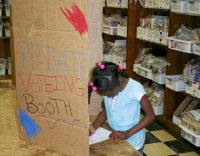Engage Future Voters with Election Projects
Your content has been saved!
Go to My Saved Content.With the presidential election dominating the news between now and November, there's no shortage of timely material to bring into classroom discussions. If used as the starting point for project-based learning, the 2012 election can engage students in thinking critically about everything from media messages to voter rights to public opinion polls.
Here are resources to help you plan projects that go deeper than current-events-style conversations.
Projects to Amplify Youth Voice
Today's high school students will soon be old enough to vote. Will they take advantage of this civic responsibility? Projects that give youth a voice about civic issues are likely to be relevant and engaging for today's students, some of who will have their first chance to vote in November.
To see how an election project can be structured to address both current events and academic learning goals, take a look at the California Propositions project developed during a previous election cycle. Justin Wells, teacher of English and Government at Metropolitan Arts and Technology High School in San Francisco, CA, describes the deep thinking behind the project in this video:
Schools across the New Tech Network, a national network of more than 100 PBL schools, are teaming up this fall on what teacher Mike Kaechele (@mikekaechele on Twitter) describes as the "Epic Election Project." Students are forming their own political parties and broadcasting their own campaign messages in a project designed to inspire critical thinking and media literacy.
Meanwhile, teachers are collaborating to share useful resources and classroom strategies. Listen to teacher Joe Urschel from Eagle Tech School in Indiana make a case for why students need to take part in projects like this:
Watch the project unfold and stay up-to-date on new resources by following the Twitter hashtag #MyParty12. Kaechele will be blogging about the project on his Concrete Classroom blog.
The New York Times Learning Network suggests engaging students in election-year politics by asking them to respond to this question: What if the voting age were lowered to 13? Between now and Sept. 21, students can weigh in with their replies. Student posts judged to be the most "interesting, articulate and thoughtful" will be featured.
The New York Times Learning Network also offers in-depth unit plans relating to the election year. The 2012 Presidential Election Unit, for example, meets Common Core State Standards for English Language Arts.
Media Literacy Projects
Prompting students to think more critically about the messages they see and hear this election season is a goal of projects that emphasize media literacy.
When students become media literate, they learn to ask critical questions about how political advertisements were constructed, who paid for them to be produced and aired, and whether the information is credible or distorted. Often, such projects lead to students producing and publishing their own media messages.
Media literacy resources that can be incorporated into projects include:
- News Literacy Project, which connects seasoned journalists with students from middle school and high school.
- Kathleen Parker of the Washington Post says the project helps students answer this essential question: How do you find the truth?
- Media Education Lab links to a number of classroom resources
- Media Literacy Clearinghouse features resources to help students analyze political ads
- Frank Baker, media literacy expert and creator of the Media Literacy Clearinghouse, shares his insights about learning from election season in a three-part interview with School Library Journal
Resources Galore
Many more resources can help you bring election season into your classroom. Here are just a few to keep in mind:
- I Side With is an interactive tool that asks users to take a short quiz, then lets them know which presidential candidate's views most closely match their opinions. Students can expand the conversation by sharing their results via social media
- Social Studies Chat, a weekly online discussion, is a good place to find like-minded social studies teachers for collaborative projects. Follow the Twitter hashtag #sschat
- Larry Ferlazzo's "Best Resources for Learning about the 2012 U.S. Presidential Election" is a goldmine of resources
Are you planning an election-year project? How will you encourage your students to think critically about presidential politics? Please share your project ideas in the comments.
